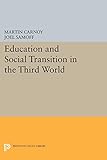Education and Social Transition in the Third World / Joel Samoff, Martin Carnoy.
Material type: TextSeries: Princeton Legacy Library ; 1044Publisher: Princeton, NJ : Princeton University Press, [2014]Copyright date: ©1990Edition: Course BookDescription: 1 online resource (426 p.)Content type:
TextSeries: Princeton Legacy Library ; 1044Publisher: Princeton, NJ : Princeton University Press, [2014]Copyright date: ©1990Edition: Course BookDescription: 1 online resource (426 p.)Content type: - 9780691601885
- 9781400860692
- 370.19 20
- LC98
- online - DeGruyter
- Issued also in print.
| Item type | Current library | Call number | URL | Status | Notes | Barcode | |
|---|---|---|---|---|---|---|---|
 eBook
eBook
|
Biblioteca "Angelicum" Pont. Univ. S.Tommaso d'Aquino Nuvola online | online - DeGruyter (Browse shelf(Opens below)) | Online access | Not for loan (Accesso limitato) | Accesso per gli utenti autorizzati / Access for authorized users | (dgr)9781400860692 |
Frontmatter -- Contents -- Tables -- Acknowledgments -- PART I: Education and Transition: Theory and Method -- CHAPTER 1. The Search for Method -- CHAPTER 2. The State and Social Transformation -- CHAPTER 3. Education and the Transition State -- PART II. The Case Studies -- CHAPTER 4. Introduction to the Case Studies -- CHAPTER 5. Struggle, Criticism, Transformation: Education in the People's Republic of China -- CHAPTER 6. Educational Reform and Social Transformation in Cuba, 1959-1989 -- CHAPTER 7. "Modernizing" a Socialist Vision: Education in Tanzania -- CHAPTER 8. The Mozambican State and Education -- CHAPTER 9. Education and Social Transformation in Nicaragua 1979-1989 -- PART III: Conclusions -- CHAPTER 10. Education and Social Transformation: Theory and Practice -- Selected Bibliography -- Index
restricted access online access with authorization star
http://purl.org/coar/access_right/c_16ec
Through a comparative analysis of educational theory and practice, this analytic overview illuminates the larger economic and political changes occurring in five peripheral countries--China, Cuba, Tanzania, Mozambique, and Nicaragua--commonly viewed as in transition to socialism. Current political patterns and leadership in these countries have emerged in the context of predominantly agricultural, industrially underdeveloped economies. Each state has played a major role in social transformation, relying on the educational system to train, educate, and socialize its future citizens. Discussing the similarities and differences among these states, the authors show the primacy of politics and the interaction of material and ideological goals in the process of social transition, and how shifting policies reflect and are reflected in educational change. This collection first examines critical analyses of education in capitalist societies, both industrialized and peripheral, and explores the utility of those perspectives in the political and educational conditions of the countries under study. Together these essays offer the first systematic explanation of how and why education in socialist countries undergoing rapid change differs from education in developing capitalist countries. Contributions to the study were made by Mary Ann Burris, Anton Johnston, and Carlos Alberto Torres.Originally published in 1990.The Princeton Legacy Library uses the latest print-on-demand technology to again make available previously out-of-print books from the distinguished backlist of Princeton University Press. These editions preserve the original texts of these important books while presenting them in durable paperback and hardcover editions. The goal of the Princeton Legacy Library is to vastly increase access to the rich scholarly heritage found in the thousands of books published by Princeton University Press since its founding in 1905.
Issued also in print.
Mode of access: Internet via World Wide Web.
In English.
Description based on online resource; title from PDF title page (publisher's Web site, viewed 30. Aug 2021)


